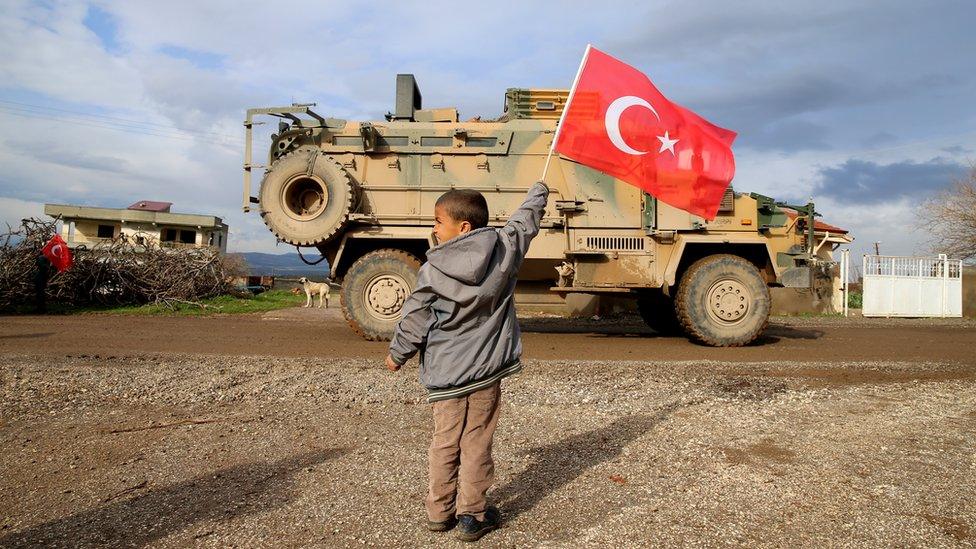Erdogan: Turkey's all-powerful leader of 20 years
- Published
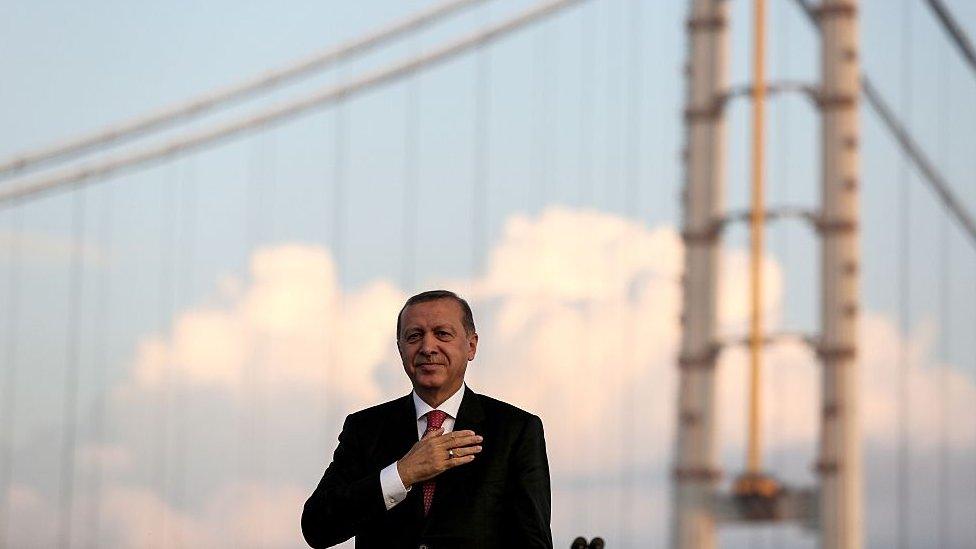
President Erdogan has spearheaded numerous major infrastructure projects as part of a programme to modernise Turkey
From humble beginnings, Recep Tayyip Erdogan has grown into a political giant, leading Turkey for 22 years and reshaping his country more than any leader since Mustafa Kemal Ataturk, the revered father of the modern republic.
Despite being buffeted by a series of crises, he still came out on top in the 2023 presidential race, maintaining his grip on power.
But he has been criticised for his increasingly repressive rule over the past years - removing checks on his own power and sidelining opponents through the court system.
This past week, his government arrested and jailed his main rival, Ekrem Imamoglu, as he was voted in as the political opposition's presidential candidate.
It has prompted hundreds of thousands of supporters to take to the street these past five days, protesting against Imamoglu's detention and Erdogan's political suppression.
Turkey's Western allies have condemned the move, while the EU has warned his government it must show a commitment to democratic norms.
But Erdogan has been on the path to autocracy for nearly a decade now, analysts say.
After he survived a coup attempt in 2016, he turned his presidency into an ever more powerful executive role, and cracked down on his opponents and dissent.
First as prime minister from 2003 and then as directly elected president since 2014, Recep Tayyip Erdogan has flexed Turkey's muscles as a regional power, championed Islamist causes and been quick to outmanoeuvre political opposition.
Although he is the head of a Nato country, he has positioned himself as a broker in Russia's war in Ukraine and kept Sweden waiting in its bid to join the Western defensive alliance. His muscular diplomacy has riled allies in Europe and beyond.
He has polarised his country but President Erdogan is a proven election winner. His supporters call him reis - "chief".
Accusing his opponents of treating Turkey's electorate with contempt and failing to win them over he declared: "As 85 million, we will protect our ballot, our will and our future."
Rise to power
Born in February 1954, Recep Tayyip Erdogan grew up the son of a coastguard, on Turkey's Black Sea coast. When he was 13, his father decided to move to Istanbul, hoping to give his five children a better upbringing.
The young Erdogan sold lemonade and sesame buns to earn extra cash. He attended an Islamic school before obtaining a degree in management from Istanbul's Marmara University - and playing professional football.
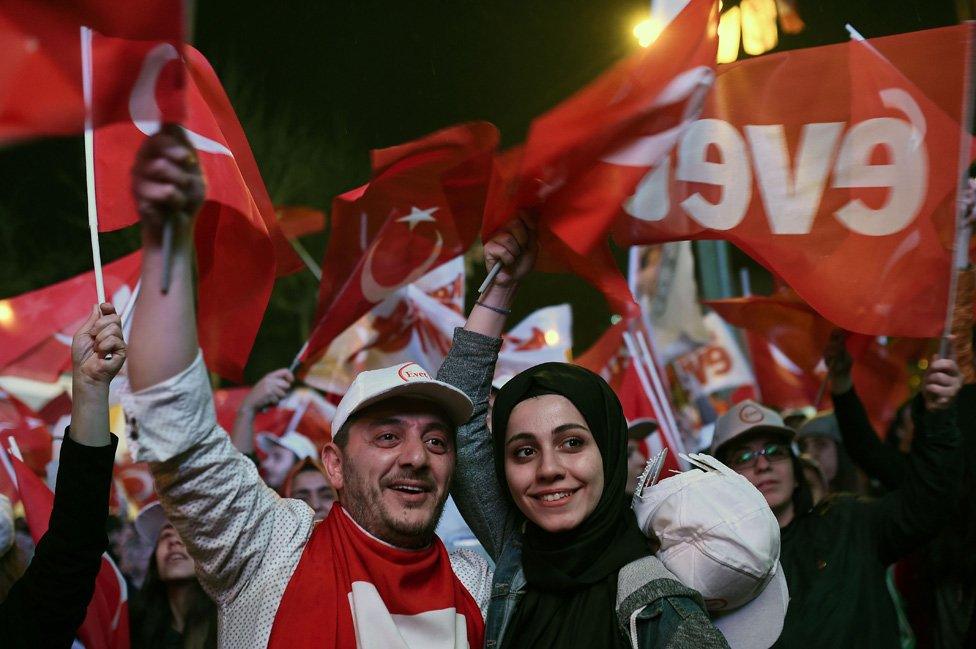
Erdogan supporters like his tough language and defence of traditional Muslim values
In the 1970s and 80s, he was active in Islamist circles, joining Necmettin Erbakan's pro-Islamic Welfare Party. As the party grew in popularity in the 1990s, Erdogan was elected as its candidate for mayor of Istanbul in 1994 and ran the city for the next four years.
But his term came to an end when he was convicted of inciting racial hatred for publicly reading a nationalist poem that included the lines: "The mosques are our barracks, the domes our helmets, the minarets our bayonets and the faithful our soldiers."
After serving four months in jail, he returned to politics. But his party had been banned for violating the strict secular principles of the modern Turkish state.
In August 2001, he founded an new, Islamist-rooted party with ally Abdullah Gul. In 2002, the AKP won a majority in parliamentary elections, and the following year Erdogan was appointed prime minister. He remains chairman of the AKP or Justice and Development Party to this day.
First decade in power
From 2003, he spent three terms as prime minister, presiding over a period of steady economic growth and winning praise internationally as a reformer. The middle class expanded and millions were taken out of poverty, as Erdogan prioritised giant infrastructure projects to modernise Turkey.
But critics warned he was becoming increasingly autocratic.
By 2013, protesters took to the streets, partly because of his government's plans to transform a much-loved park in the centre of Istanbul, but also in a challenge to more authoritarian rule. The prime minister condemned the protesters as "capulcu" (riff-raff), and neighbourhoods would clang pots and pans at nine o'clock every night in a spirit of defiance. Allegations of corruption ensnared the sons of three cabinet allies.
The Gezi Park protests marked a turning point in his rule. To his detractors, he was acting more like a sultan from the Ottoman Empire than a democrat.
Erdogan also fell out with a US-based Islamic scholar called Fethullah Gulen, whose social and cultural movement had helped him to victory in three consecutive elections and had been active in removing the military from politics. It was a feud that would have dramatic repercussions for Turkish society.
Muslim revival
After a decade of his rule, Erdogan's party also moved to lift a ban on women wearing headscarves in public services that was introduced after a military coup in 1980. The ban was eventually lifted for women in the police, military and judiciary.
Critics complained he had chipped away at the pillars of Mustafa Kemal Ataturk's secular republic. While religious himself, Erdogan always denied wanting to impose Islamic values, insisting he supported the rights of Turks to express their religion more openly.
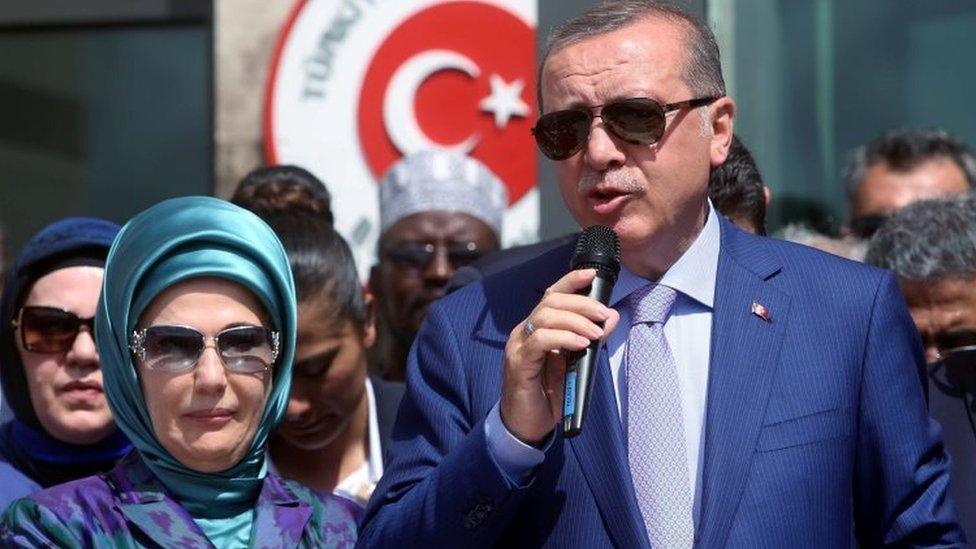
Erdogan's wife Emine often appeared in public in a headscarf
However, he has repeatedly supported criminalising adultery. And as a father of four, he has said "no Muslim family" should consider birth control or family planning. "We will multiply our descendants," he said in May 2016.
He has extolled motherhood, condemned feminists, and said men and women cannot be treated equally.
Erdogan has long championed Islamist causes - and was known to give the four-finger salute of Egypt's repressed Muslim Brotherhood.
In July 2020, he oversaw the conversion of Istanbul's historic Hagia Sophia into a mosque, angering many Christians. Built 1,500 years ago as a cathedral, it was made into a mosque by the Ottoman Turks, but Ataturk had turned it into a museum - a symbol of the new secular state.
Cementing his grip
Barred from running again for prime minister, in 2014 he stood for the largely ceremonial role of president in unprecedented direct elections. He had big plans for reforming the post, creating a new constitution that would benefit all Turks and place their country among the world's top 10 economies.
But early in his presidency, he faced two jolts to his power. His party lost its majority in parliament for several months in a 2015 vote, and then months later, in 2016, Turkey witnessed its first violent attempted coup for decades.
Rebel soldiers came close to capturing the president, holidaying at a coastal resort, but he was airlifted to safety. In the early hours of 16 July, he emerged triumphant at Istanbul's Ataturk Airport, to the cheers of supporters. Almost 300 civilians were killed as they blocked the advance of the coup plotters.
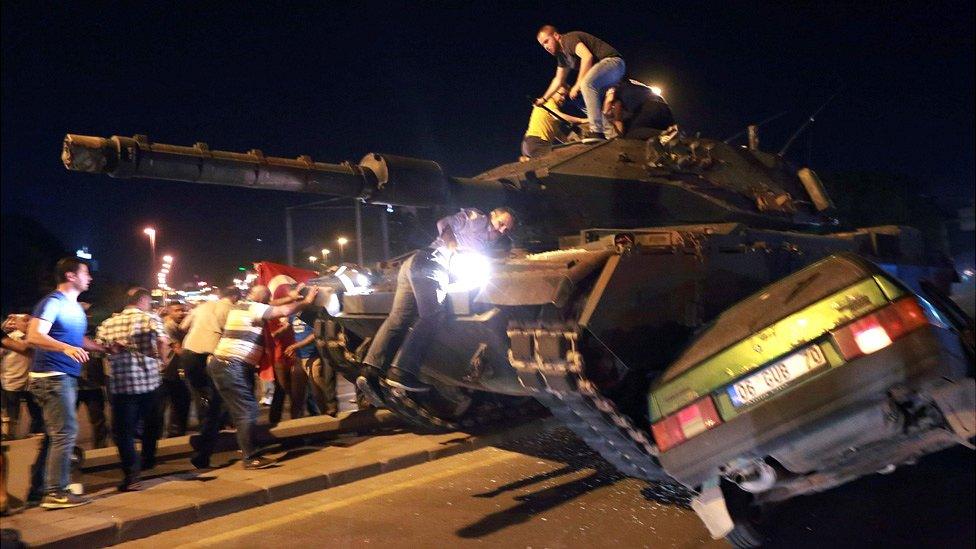
Ankara, 16 July 2016: Erdogan supporters thwarted a military coup in a night of drama
The president appeared on national TV and rallied supporters in Istanbul, declaring he was the "chief commander". But the strain was clear when he sobbed openly while giving a speech at the funeral of a close friend, shot with his son by mutinous soldiers.
The plot was blamed on the Gulen movement and led to some 150,000 public servants being sacked and more than 50,000 people being detained, including soldiers, journalists, lawyers, police officers, academics and Kurdish politicians.
This crackdown on critics caused alarm abroad, contributing to frosty relations with the EU: Turkey's bid to join the union has not progressed for years. Arguments over an influx of migrants into Greece exacerbated the ill-feeling.
But from his gleaming, 1,000-room Ak Saray palace overlooking Ankara, President Erdogan's position appeared more secure than ever.
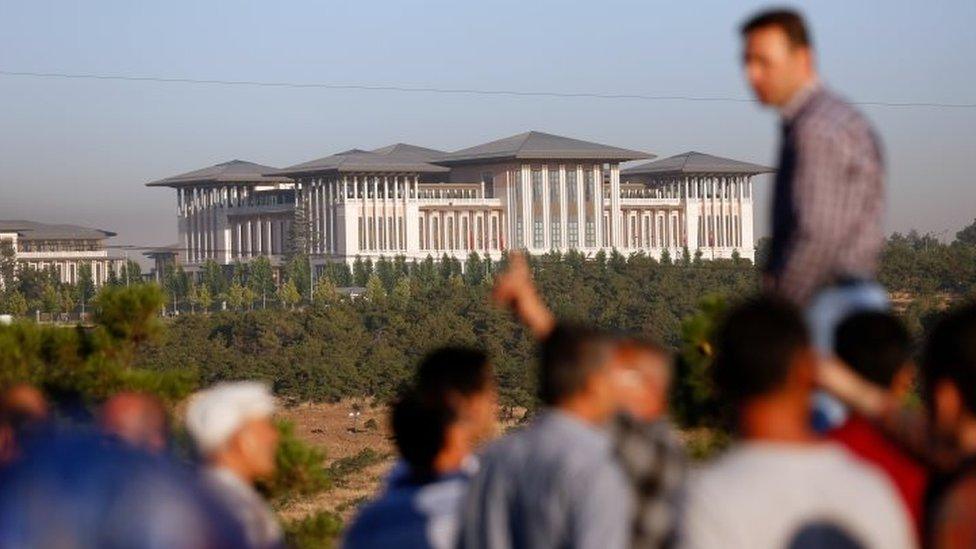
Controversy has surrounded Erdogan's costly and sprawling presidential palace in Ankara
He narrowly won a 2017 referendum granting him sweeping presidential powers, including the right to impose a state of emergency and appoint top public officials as well as intervene in the legal system.
A year later, he secured outright victory in the first round of a presidential poll.
His core vote lies in small Anatolian towns and rural, conservative areas. In 2019, his party lost in the three biggest cities - Istanbul; the capital, Ankara; and Izmir.
Losing the Istanbul mayoralty narrowly to Imamoglu of the main opposition Republican People's Party (CHP) was a bitter blow to Erdogan, who was the city's mayor in the 1990s. He never accepted the result.
Imamoglu was ahead of the president in the opinion polls before he was barred from running in the 2023 May presidential elections. The president and his allies were accused of using the courts to disqualify the popular mayor from the vote.
Imamoglu was given a jail sentence in 2022 for insulting a public official, but he has been appealing against it, which allowed him to remain in politics. Imamoglu's arrest and charges this time around concern more serious charges of terrorism and corruption.
Turkish media on Monday reported his arrest with the inference that he had been the most credible challenger to Erdogan.
Last year the president removed several elected mayors who belonged to opposition parties, replacing them with government-appointed ones.
Activists, politicians, journalists and also the country's top business group have become targets of contentious court cases.
But the Istanbul mayor's arrest in recent days is seen as an escalation in Erdogan's tendency to wield his powers to eliminate rivals.
Analysts argue he is making the move at an opportune moment on the world stage: European pressure on Turkey is constrained by Nato's defence concerns in regards to the Ukraine-Russia war, and there is little White House appetite to criticise authoritarianism in other countries.
Despite being the leader of a Nato state, Erdogan has long held close ties with Russia's Vladimir Putin and has sought a pivotal role as a mediator in the conflict in Ukraine. Unlike most European powers, Turkey has engaged directly in both military support for Ukraine and diplomatic outreach to Russia.
- Published2 November 2022
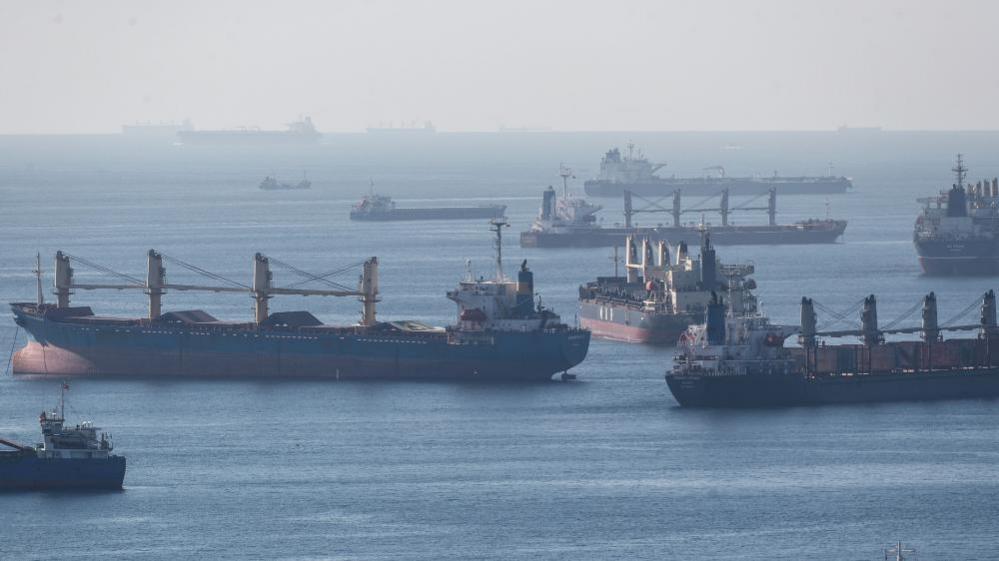
- Published16 October 2020
